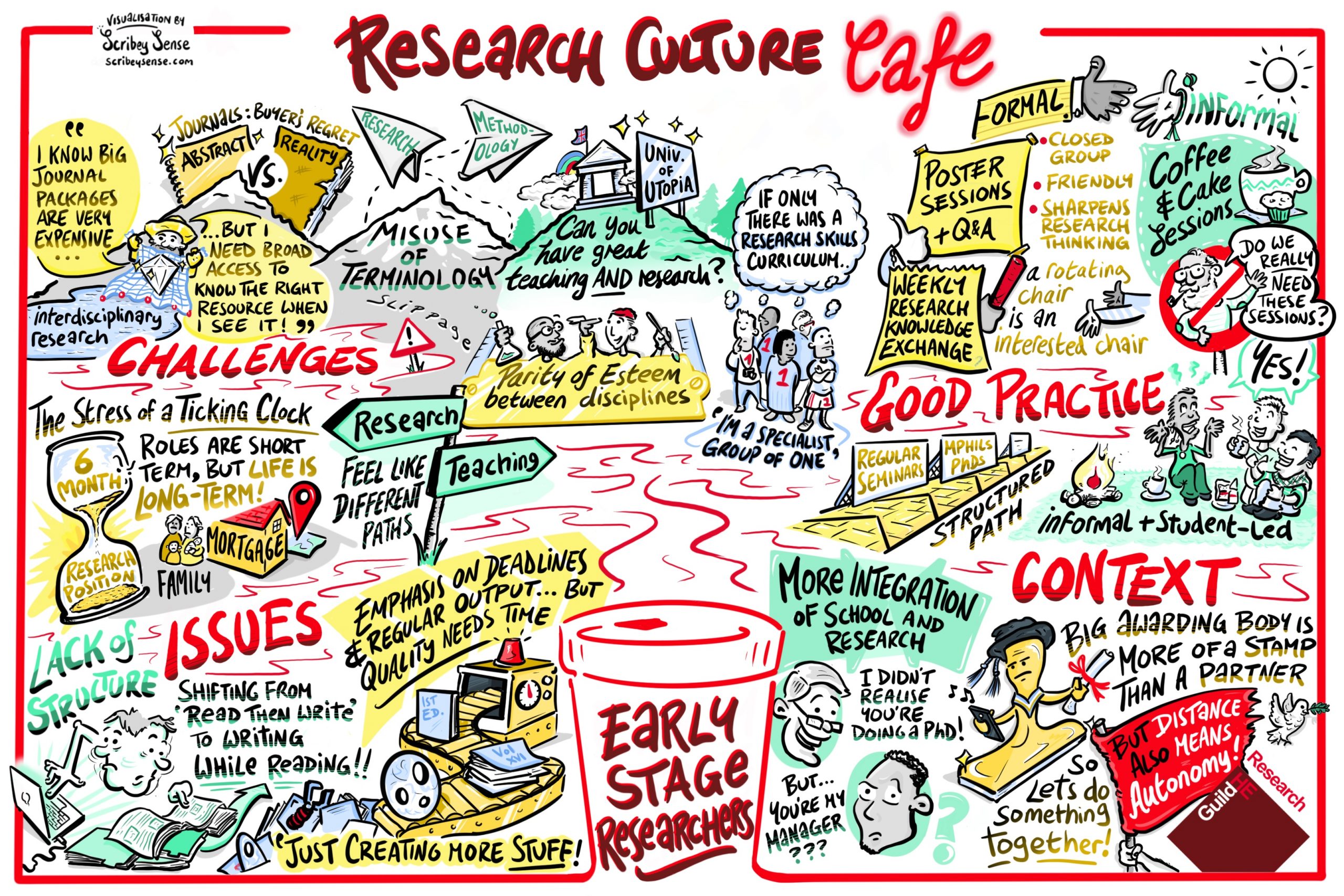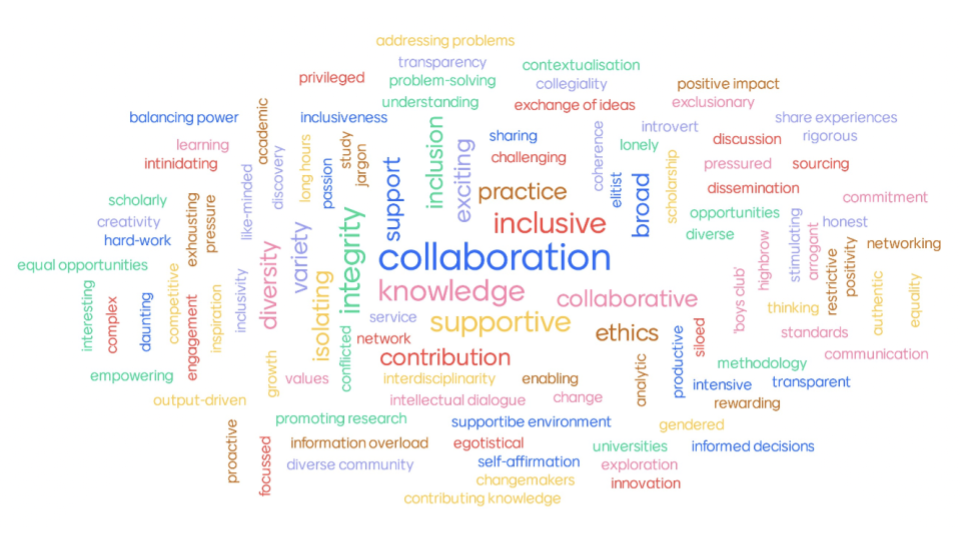What is research culture? How do you go about improving it? And are there significant differences to research culture at smaller and specialist institutions that we need to consider?
In 2023 GuildHE Research sought to interrogate these questions. We developed a series of activities which members could support through the ‘Enhancing Research Culture’ element of Research England’s strategic institutional funding.
The activities included a series of Research Culture Cafés. These were based on the toolkits developed by Wellcome Trust and the Association for Research Managers and Administrators (ARMA), enhanced to include inquiries into the particular research environments at smaller and specialist institutions.

Graphic recording of the Research Culture Cafe held with Early Stage Researchers
Research Culture at Smaller and Specialist Institutions – what might be different?
We know that researchers at smaller and specialist instittuions are time poor, and our members are dispersed geographically, in some cases located in ‘cold spots’ – regions without other higher education or research organiations present. They are in teaching intensive institutions where research time is at a premium and teaching commitments prevent many from taking part in sector discussions.
Typically these research environments are small in scale, whilst being excellent and ambitious in scope, and sited within smaller scale institutions and / or institutions with a particular disciplinary focus. The research office may be a single person, or perhaps a small group of professionals, and there may not yet be a member of the senior management team with exclusive responsibility for research. External research income is low compared to the rest of the sector, and / or the disciplinary focus is such that income is derived from non-traditional sources, such as arts councils. That makes the experience of doing research potentially quite distinct from a multi-faculty and research intensive institution.
Furthermore, from our research into our postgraduate student body we also know those in early stages of their research careers share different characteraistics to the rest of the sector; they are more likely to be self funded and be mature students with other work and personal commitments. Again, this makes their experience quite distinct. As these early stage researchers may be consolidating successful careers in industry and professions, they also come to research environments with different expectations, and perhaps different goals than a researcher that has taken a more standard path.
Capturing our Café Discussions
Cafés were held with Early Stage Researchers, Principal Investigators, and Research Leads, with a further discussion with Postgraduate Researchers at the 2023 GuildHE Research Doctoral Festival.
Each session was facilitated by Rachel Persad, Policy Manager for Research & Innovation at GuildHE, and vividly captured by graphic recorder Dan Andrews of Scribey Sense.
When designing the sessions it was important to find methods of engagement that were as flexible as possible, and which generated materials that could be quickly absorbed and could be used for ongoing conversations in each institution.
Online cafés were a must due to the wide geography of our member institutions (from Falmouth to Cumbria, and Norwich to Wrexham). Participants were provided with questions in advance, and guidance about the sessions, including informtion about how the materials was to be used. An online white board was developed on Mual to capture discussions and gather reflections, enabling participants that preferred to write comments a space to do so.
- GuildHE Research Culture Café Discussion Structure
- Exploring the issues : Using quotes from the Wellcome and ARMA reports to stimulate thinking
- Understanding the challenges : Identifying key challenges and why they are an issue
- Who can make the change and how : Supported by prompts for the individuals and institutions that might enact change, and suggested actions they might take
- How that maps onto research at smaller and specialist institutions : Recognising that they have common features that are different to most of the HE sector, considering ways to make change that would realistically impact research culture at these types of institutions.
Why record the conversations graphically?
Graphic recording was adopted as a result of our desire to create materials from the discussions that could be used for ongoing discussions by our members, and also by others in the sector. We are also conscious that our audience is very diverse; our institutions are specialists in everything from art and design, to maritime, to agriculture and sports science. Using images, and not just text, allows our community to engage with the content in ways that will open up conversations between individuals with very different knowledge bases and approaches to research.
The graphic approach allowed themes to emerge from discussions, and helped us make sense of the overall shape and tone of the conversations. The use of images, metaphors, and humour stimulate thinking about challenging topics, such as inclusion / exclusion, and also bring areas that need more support, such as understanding Open Access, to the fore in ways that make it safe to admit that knowledge may be lacking.
Our reflections
Notably we saw significant differences in emphasis in discussions with our communities as compared to the themes emerging in the work done in research culture by the Wellcome Trust.
For example, researchers talked more frequently about the wider impact of their work, considering the value to society as a fundamental outcome, and how their research integrated with the teaching at the institutions.
Career precarity was a commonly expressed issue but was perhaps presented differently, being posited within larger debates of parity of esteem between disciplines, and feeling of isolation as a small number of researchers within teaching intensive institutions.
Finally we noted less distrust of the institution, a greater sense of community, and more hope for the potential to change research culture for the better, particularly through collaboration.
The discussions were useful in surfacing the wider context of research and innovation policy, and the impetus given for certain actions by institutions as a result of government and funder decisions. It may be that frequent, informal, safe, and open discussions with research communities would enable us all to understand where messages have not quite got through, or where they have simply not been understood.
In many cases it was clearly a relief that researchers in other institutions were facing the same or similar pressures and challenges, and that there may be great value in resolving those above, beyond, and between institutions.

A word cloud was created from all the cafe discussions in response to the question ‘What words do you associate with Research Culture’ which provides some additional insights.
Next steps
We welcome others to download the graphics to stimulate discussions about Research Culture amongst their institutions and research groups. We would love to know how they are being used and if they have proved useful.
GuildHE will continue to engage with sector work in this area, notably Vitae’s work to develop a Good Practice Exchange on Research Culture and the REF 2029 People, Culture and Environment pilot.
For more information and access to the Mural template contact research@guildhe.ac.uk


Recent Comments